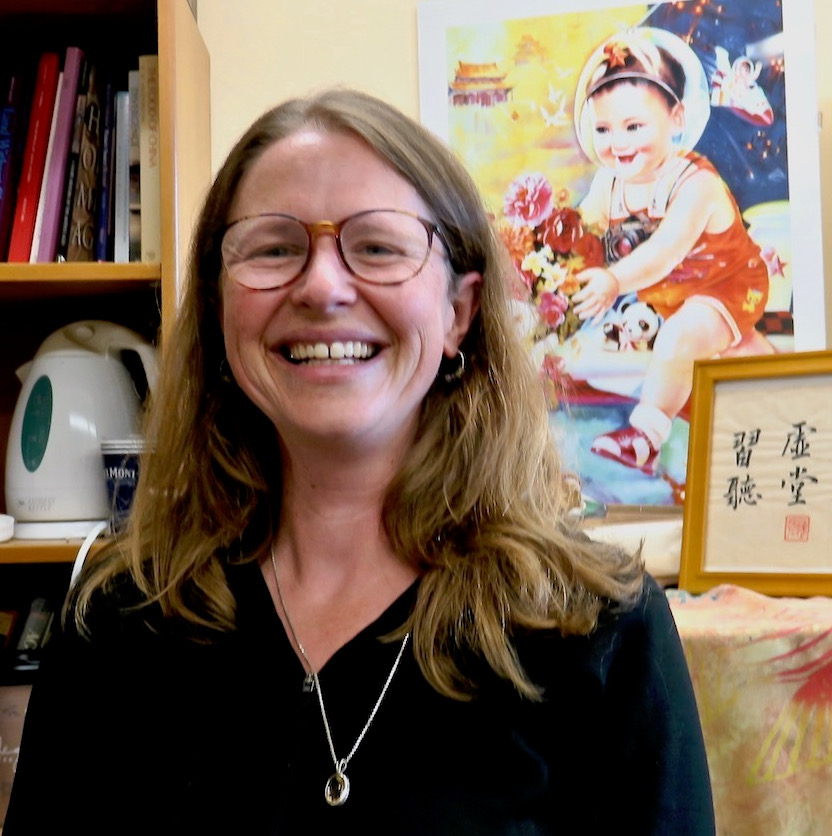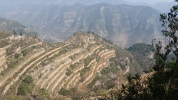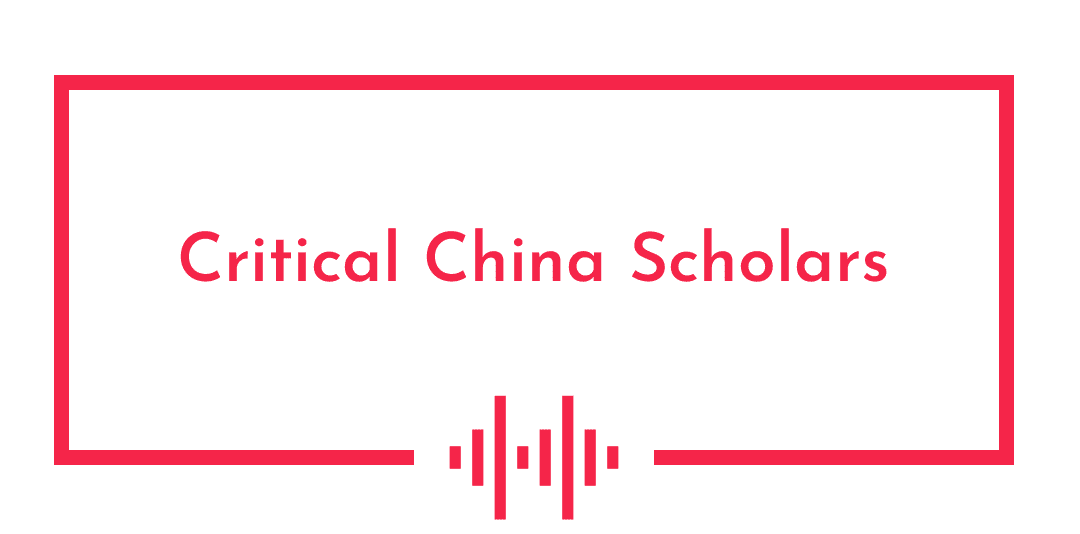
Sigrid Schmalzer
舒喜乐
Professor of History
University of Massachusetts Amherst
Ph.D. in Modern Chinese History and Science Studies, University of California, San Diego, 2004
Herter Hall 631
University of Massachusetts
161 Presidents Drive
Amherst, MA 01003-9312
sigrid@umass.edu
Current Projects
Heritage and Survival: The Power of Agricultural Knowledge in the People’s Republic of China (current book project)
 Agriculture sits at the intersection of our world's most crucial struggles: it is a matter of who eats, who labors and how that labor is recognized, whose traditions are preserved, how political and economic power is distributed, what happens to local ecologies, and how much carbon we can sequester to slow climate change. China -- with its deep identity as an ancient agricultural civilization, its more recent history of socialist revolution and economic development, its vast and rapidly transforming population of farmers, and its formidable environmental challenges -- stands as a source of both inspiration and anxiety for people around the world grappling with the future of food.
Agriculture sits at the intersection of our world's most crucial struggles: it is a matter of who eats, who labors and how that labor is recognized, whose traditions are preserved, how political and economic power is distributed, what happens to local ecologies, and how much carbon we can sequester to slow climate change. China -- with its deep identity as an ancient agricultural civilization, its more recent history of socialist revolution and economic development, its vast and rapidly transforming population of farmers, and its formidable environmental challenges -- stands as a source of both inspiration and anxiety for people around the world grappling with the future of food.Through a series of engaging case studies of agriculture in socialist and post-socialist China, this book will explore the intertwined themes of knowledge, environment, and history, while confronting the thorny dilemmas of state power, capitalism, and technocracy. What is "traditional agriculture," how is it being used to envision the future, and when does it promote survival or exploitation? What is an "agroecological system," where did this concept come from, and how does it relate to political ideologies -- both liberatory and oppressive? What is "food sovereignty," where are its roots in the Maoist past and ongoing transnational social movements, and what is its potential for building just and sustainable agricultural practices? Beyond these questions, topics will include agroecology, systems science, agricultural heritage studies, mass science and indigenous knowledge, participatory action research, and the relationship between ecocivilization and ecoauthoritarianism. Specific agricultural technologies discussed will include integrated fish farming, terracing, plant-based insecticides, "Chinese medicine agriculture," and networks for seed preservation and exchange.
Critical China scholars
 The Critical China Scholars formed in 2020 in the face of the COVID-19 crisis and worsening US-China relations. CCS is committed to offering informed, critical analysis on China that focuses on the root causes of injustice — including capitalism, authoritarianism, imperialism, racism, and patriarchy — that transcend national boundaries. We oppose the dangerous rhetoric that demonizes the PRC and its citizens, and subjects those of Asian appearance to racist prejudice. At the same time, we recognize the justice of movements that resist oppression by the Chinese state, and we stand in solidarity with political activists fighting for labor, gender, ethnic, religious, and environmental justice. We refuse to allow one priority to outweigh the other. Please see our website for our full statement of principles and for a video and audio archive of our two-part event, "Viral Politics: Left Perspectives on the World and China."
The Critical China Scholars formed in 2020 in the face of the COVID-19 crisis and worsening US-China relations. CCS is committed to offering informed, critical analysis on China that focuses on the root causes of injustice — including capitalism, authoritarianism, imperialism, racism, and patriarchy — that transcend national boundaries. We oppose the dangerous rhetoric that demonizes the PRC and its citizens, and subjects those of Asian appearance to racist prejudice. At the same time, we recognize the justice of movements that resist oppression by the Chinese state, and we stand in solidarity with political activists fighting for labor, gender, ethnic, religious, and environmental justice. We refuse to allow one priority to outweigh the other. Please see our website for our full statement of principles and for a video and audio archive of our two-part event, "Viral Politics: Left Perspectives on the World and China."
Science for the People
 In the years since the UMass conference "Science for the People: The 1970s and Today," organizers around the US and beyond have taken up the work of revitalizing SftP. I am proud to be a part of that effort. We had our first convention in February, 2018 in Ann Arbor, Michigan. The magazine is back and vibrant as ever, and there are now chapters in numerous places in the US, Canada, and Southern Africa, along with affiliated organizations in other parts of the world. Our local Western Mass chapter has focused on: 1) solidarity work with grassroots and campus-based organizations; 2) developing K-12 science and social justice curricula; and 3) putting on events on the UMass campus designed to bring together STEM workers and justice organizers. Check out this article by Rebecca Onion in Slate: "A Radical ’70s-Era Group Is Relaunching to Help Scientists Get Political Under Trump."
In the years since the UMass conference "Science for the People: The 1970s and Today," organizers around the US and beyond have taken up the work of revitalizing SftP. I am proud to be a part of that effort. We had our first convention in February, 2018 in Ann Arbor, Michigan. The magazine is back and vibrant as ever, and there are now chapters in numerous places in the US, Canada, and Southern Africa, along with affiliated organizations in other parts of the world. Our local Western Mass chapter has focused on: 1) solidarity work with grassroots and campus-based organizations; 2) developing K-12 science and social justice curricula; and 3) putting on events on the UMass campus designed to bring together STEM workers and justice organizers. Check out this article by Rebecca Onion in Slate: "A Radical ’70s-Era Group Is Relaunching to Help Scientists Get Political Under Trump."
Book Series: Activist Studies of Science and Technology
I am the editor of a book series with UMass Press titled "Activist Studies of Science and Technology." The series publishes accessible, engaging books on science and technology in support of movements for justice and sustainability around the world. Our most recent book in the series is: Christa Kuljian's Our Science, Ourselves: How Gender, Race, and Social Movements Shaped the Study of Science. We have more projects in the pipeline and are continuing to invite manuscripts in these areas:- Historical and social science research on social and political activism in science, technology, and/or medicine and on the impact of new technologies on activism
- Critical histories of science, technology, or medicine that aid in understanding issues of current political relevance
- Applications of STS (science and technology studies) theory to support social movements and/or to reconstruct technoscience along activist lines
- Critical studies in the political economy of science, technology, and/or medicine
- Biographies, oral histories, and memoirs of activist scientists
Union Organizing
 I am currently serving as co-president of the MSP (the union of faculty and librarians at UMass Amherst), which will be celebrating its 50th anniversary in 2026. We are proud to have some of the strongest language around academic freedom and non-tenure-track faulty rights in the country, and we continue to work tirelessly to improve working conditions and protect our members' abilities to fulfill their goals in research, teaching, and service.
I am currently serving as co-president of the MSP (the union of faculty and librarians at UMass Amherst), which will be celebrating its 50th anniversary in 2026. We are proud to have some of the strongest language around academic freedom and non-tenure-track faulty rights in the country, and we continue to work tirelessly to improve working conditions and protect our members' abilities to fulfill their goals in research, teaching, and service.
Selected Publications
Opinion Pieces
- "Beholding Yuan Longping in the Light of Recent Chinese History," positions politics, June 24, 2021 (Chinese version published in The Initium: 「綠色革命」還是「紅色革命」?袁隆平與他身後的中國科學意識形態史)
- "How Would an Inclusive Community Talk about China?," The Massachusetts Review, 29 October 2020
- "Don't Just Defend Science, Mobilize It for the People," Inside Higher Education, 14 March 2017
Children's Book
 Moth and Wasp, Soil and Ocean: Remembering Chinese Scientist Pu Zhelong, illustrated by Melanie Linden Chan (Tilbury House, 2018). See also this related blog post: "Exposure Therapy: What I Learned Writing My First Book for Children." Teachers may appreciate this hour-long webinar (made available by the Five College Center for East Asian Studies), where I talk about the larger historical themes and offer a page-by-page discussion using Meghan Dowd Lambert's "whole book approach" to reading picture books. This Reader Guide offers discussion questions and activities for use in the classroom.
Moth and Wasp, Soil and Ocean: Remembering Chinese Scientist Pu Zhelong, illustrated by Melanie Linden Chan (Tilbury House, 2018). See also this related blog post: "Exposure Therapy: What I Learned Writing My First Book for Children." Teachers may appreciate this hour-long webinar (made available by the Five College Center for East Asian Studies), where I talk about the larger historical themes and offer a page-by-page discussion using Meghan Dowd Lambert's "whole book approach" to reading picture books. This Reader Guide offers discussion questions and activities for use in the classroom. Winner of the 2018 Freeman Book Award for children's literature on East and Southeast Asia; winner of the 2018 Sigurd F. Olson Nature Writing Award; named a Notable Social Studies book for 2019 by the National Council for the Social Studies (NCSS) and the Children’s Book Council; and listed as a CCBC Choices 2019 book by the Cooperative Children's Book Center of the School of Education at the University of Wisconsin-Madison.



Please see this list of Five "Best Books on Inspirational Scientists for Children" that I created for Shepherd.com.
Academic Books
 Red Revolution, Green Revolution: Scientific Farming in Socialist China (University of Chicago Press, 2016). Winner of the 2018 Joseph Levenson Book Prize (for books on China, post-1900) from the Association for Asian Studies. Carla Nappi of the New Books Network interviewed Sigrid about this book. Listen to the podcast here.
Red Revolution, Green Revolution: Scientific Farming in Socialist China (University of Chicago Press, 2016). Winner of the 2018 Joseph Levenson Book Prize (for books on China, post-1900) from the Association for Asian Studies. Carla Nappi of the New Books Network interviewed Sigrid about this book. Listen to the podcast here.
 The People's Peking Man: Popular Science and Human Identity in Twentieth-Century China (University of Chicago Press, 2008). Winner of the 2009 Allan Sharlin Award from the Social Science History Association.
The People's Peking Man: Popular Science and Human Identity in Twentieth-Century China (University of Chicago Press, 2008). Winner of the 2009 Allan Sharlin Award from the Social Science History Association.
 Alyssa Botelho, Daniel S. Chard, and Sigrid Schmalzer, eds., Science for the People: Documents from America’s Movement of Radical Scientists, 1969-1989 (Amherst: University of Massachusetts Press, 2018). Chad Valasek of the New Books Network interviewed Sigrid about this book. Listen to the podcast here.
Alyssa Botelho, Daniel S. Chard, and Sigrid Schmalzer, eds., Science for the People: Documents from America’s Movement of Radical Scientists, 1969-1989 (Amherst: University of Massachusetts Press, 2018). Chad Valasek of the New Books Network interviewed Sigrid about this book. Listen to the podcast here.
 James A. Cook, Joshua Goldstein, Matthew D. Johnson, and Sigrid Schmalzer, eds., Visualizing Modern China: Image, History, and Memory, 1750-Present (Lanham, Md.: Lexington Books, 2015), with accompanying website.
James A. Cook, Joshua Goldstein, Matthew D. Johnson, and Sigrid Schmalzer, eds., Visualizing Modern China: Image, History, and Memory, 1750-Present (Lanham, Md.: Lexington Books, 2015), with accompanying website.
Articles and Book Chapters
- "Failed Worlds? The Dazhai Road and the Whole Earth Catalog," in The Cambridge History of Technology, vol. 2 (Cambridge University Press, forthcoming)
- "Taste 100 Herbs: Material Scarcity and Local Plant Knowledge in the Mao-Era Campaign for Native Pesticides," in Modern Chinese Foodways, ed. Fu, King, and Klein (MIT Press, forthcoming 2025)
- Kavita Philip and Sigrid Schmalzer, "Old Contradictions and New Possibilities in Marxist Indigenous Praxis," Science for the People 26.2 (2024): 8-13, 42
- "Weaving on a Radical Loom: History, Epistemology, and Science Activism," Marxism & Sciences 2.2 (2023): 65-89
- "Prometheus and the Fishpond: A Historical Account of Agricultural Systems and Eco-Political Power in the People’s Republic of China," Made in China Journal , 27 September 2022
- "Earthy Knowledge: Rethinking Chinese Terracing Campaigns," Science for the People 25.1 (2022)
- "Beyond Bias: Critical Analysis and Layered Reading of Mao-Era Sources," positions: asia critique 29.4 (2021): 759-82. (PREPRINT)
- "The Global Comrades of Mr. Democracy and Mr. Science: Placing May Fourth in a Transnational History of Science Activism," EASTS 16.3 (2022): 305-26 (published online 21 May 2021) (PREPRINT)
- "Breeding New Knowledge at Home: The Case of the Albanian Olive Friendship Tree in China," Chinese Annals of History of Science and Technology 3.2 (2019): 195-214.
- "Look from Afar: Fragmented Authority in China and the United States" ("Second Look" review of John Burnham's How Superstition Won and Science Lost), Isis 110.4 (2019): 762-65.
- "Layer upon Layer: Mao-Era History and the Construction of China’s Agricultural Heritage," EASTS 13.3 (2019): 413-441. (PREPRINT)
- "Red and Expert," in Christian Sorace, Ivan Franceschini, and Nicholas Loubere, eds., Afterlives of Chinese Communism: Political Concepts from Mao to Xi (Verso, 2019). (free download from ANU Press; also available in print for purchase from Verso)
- "China's Great Leap Famine: Malthus, Marx, Mao, and Material Scarcity," in Fredrik Albritton Jonsson; John Brewer; Neil Alan Fromer; Frank Trentmann, eds. Scarcity in the Modern World: History, Politics, Society and Sustainability, 1800-2075 (Bloomsbury, 2019). PREPRINT
- 又红又专 、 土洋结合 --- 从蒲蛰龙生物害虫防治的科研活动看 20 世纪 50-70 年代中国的 " 科学 " 观 (Being Red and Expert,Combining Tu and Yang: Visions of "Science" in 1950s-1970s China through the Lens of Pu Zhelong's Research on the Biological Control of Insect Pests). Translated by 田田 (Tian Tian).中国科技史杂志 (The Chinese Journal for the History of Science and Technology) 39.2 (2018): 153-68.
- “Toward a Transnational, Trans-1978 History of Food Politics in China: An Exploratory Paper,” PRC History Review 3.1 (2018), available online 31 Oct. 2017.
- (co-authored) "Roundtable: New Narratives of the Green Revolution," Agricultural History 91.3 (2017): 397-422.
- "Yuan Longping, Hybrid Rice, and the Meaning of Science in the Cultural Revolution and Beyond," Endeavor 41.3 (2017): 94-101. PREPRINT
- “Teaching the History of Radical Science with Materials on Science for the People (1969-1989),” Radical History Review 127 (2017): 173-79. PREPRINT
- Madhumita Saha and Sigrid Schmalzer, “Green-Revolution Epistemologies in China and India: Technocracy and Revolution in the Production of Scientific Knowledge and Peasant Identity,” British Journal for the History of Science Themes, 1-23. published on line 23 March 2016.
- "Youth and the 'Great Revolutionary Movement' of Scientific Experiment in 1960s-70s Rural China," in Jeremy Brown and Matthew Johnson, eds. Maoism at the Grassroots (Harvard University Press, 2015). PREPRINT
- "Self-Reliant Science: The Impact of the Cold War on Science in Socialist China," in Naomi Oreskes and John Krige, eds. Science and Technology in the Global Cold War (MIT Press, 2014). PREPRINT
- "Insect Control in Socialist China and the Corporate Unites States: the Act of Comparison, the Tendency to Forget, and the Construction of Difference in 1970s U.S.-Chinese Scientific Exchange," Isis 104.2 (2013): 303-329. PREPRINT
- "Speaking about China, Learning from China: Amateur China Experts in 1970s America," Journal of American-East Asian Relations 16.4 (2009): 313-52. PREPRINT
- "On the Appropriate Use of Rose-Colored Glasses: Reflections on Science in Socialist China," Isis 98.3:571-583, September 2007. PREPRINT
- "Popular Science, A Useful and Productive Category after All", Historical Studies in the Natural Sciences 42.5 (2012): 590-600.
- "The Very First Lesson: Teaching about Human Evolution in 1950s China," in Dilemmas of Victory, ed. Jeremy Brown and Paul Pickowicz (Cambridge, Mass.: Harvard University Press, 2007).
- "Labor Created Humanity: Cultural Revolution Science on Its Own Terms," in The Chinese Cultural Revolution as History, ed. Joseph Esherick, Paul Pickowicz, and Andrew Walder (Stanford, Cal.: Stanford University Press, 2006).
- "Fishing and Fishers in Penghu, Taiwan, 1895-1970," East Asian History 23:109-128, June 2002.
- "Breeding a Better China: Pigs, Practices, and Place in a Chinese County, 1929-1937," The Geographical Review 92(1): 1-22, January 2002.
Conference and Website
- "Science for the People: The 1970s and Today" (conference held 11-13 April 2014 at UMass Amherst; website preserves video of all speakers and panels along with archival materials documenting the history of the organization Science for the People)